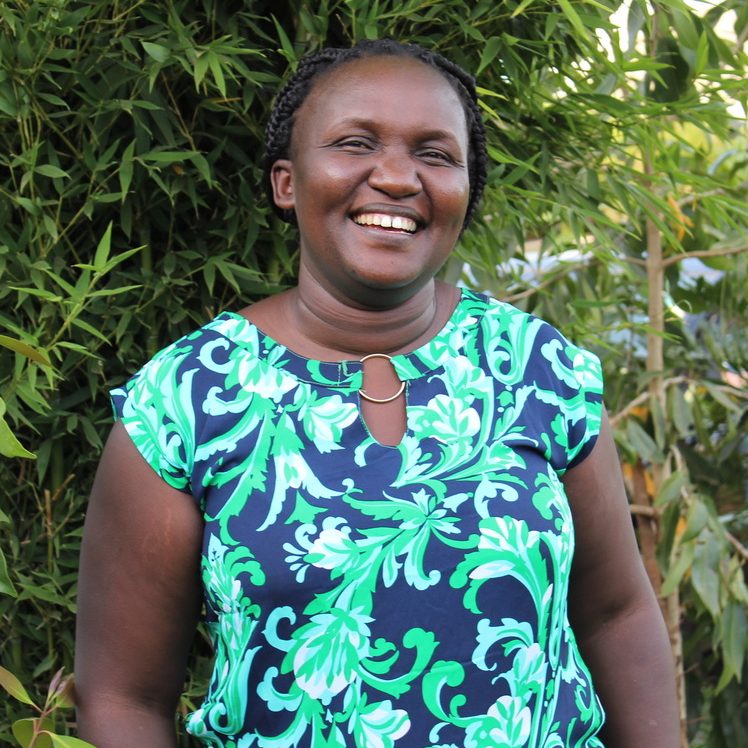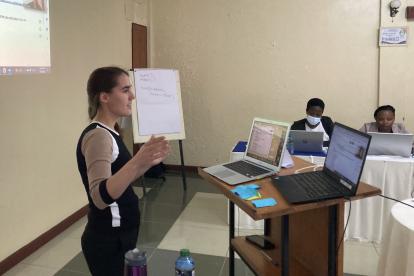
Zena Lapp, left, and Christine Markwalter led a three-day coding workshop for colleagues in Kenya that has turned into a lasting collaboration.
Published April 5, 2023, last updated on June 14, 2023 under Around DGHI

Last year, Emmah Kimachas had a problem. A data manager for AMPATH in Kenya, she was struggling to create charts and graphs to share with her research collaborators at the Duke Global Health Institute. She had limited experience with the software, a tool called Stata, and few places to turn for help.
“If I can’t visually represent my data, I can’t present it to my stakeholders, my colleagues and at events such as conferences” Kimachas says. “And in Kenya, it’s really expensive to purchase Stata as an individual.”
That’s when Kimachas met Christine Markwalter, Ph.D., and Zena Lapp, Ph.D., who both work with the Duke Malaria Collaboratory, a research project with deep ties in Kenya. In July 2022, Markwalter and Lapp led a three-day workshop on the fundamentals of data visualization for 20 colleagues in Eldoret, Kenya. The sessions included a hands-on introduction to R, a free data analysis programming language.
“They went from not knowing any code to being able to analyze and visualize their data at the end of three days,” says Markwalter, who began at DGHI as a postdoctoral fellow and recently became an instructor with DGHI’s Master of Science in Global Health program. “It really shows the gap the workshop was able to fill. This is about doing research well and opening the door to opportunities for others.”

Christine Markwalter leads a workshop in...
Lapp, a postdoctoral associate studying infectious diseases, taught the R programming language to researchers while at the University of Michigan. She said the enthusiasm among the participants in the Kenya workshops was unlike anything she’s seen.
“They said three days wasn’t enough. They wanted five,” she says. “Our ultimate goal was for those who attended to continue using R. We want them to become self-sustaining and continue to teach others.”
And that’s exactly what’s been happening. After the workshop, Lapp and Markwalter created a group on WhatsApp where the participants discuss coding projects. The group also meets monthly over Zoom to share their work and get help solving problems.
Since the workshop, Kimachas has prepared more than five visual projects using data on malaria. She helped create the poster her colleagues presented at the Pan-African Mosquito Control Association’s Conference in 2022 and at the Kenya National Malaria Conference in Nairobi this year.
“I’ve been proud of myself, learned something and can use it anywhere and anytime,” Kimachas says. “Now, I am part of the data that’s being put out there.”
The workshop was supported by Wendy Prudhomme O’Meara, Ph.D., an associate professor of medicine and global health and DGHI’s deputy director. O’Meara’s lab works closely with AMPATH and Moi University in Kenya to study malaria transmission and control in the region. Her research is also part of the Duke Malaria Collaboratory, which is led by Steve Taylor, M.D., an associate professor of medicine and global health.
“It really speaks to Wendy’s commitment to building capacity in Kenya, not just physical, with research skills and expertise,” Markwalter says. “It’s something we admire about Wendy and the work she does. We felt an incredible level of support.”
Lapp and Markwalter are planning to host another workshop in Kenya this summer. Kimachas, and some of last year’s participants, plan to returnas instructors and help teach the curriculum.
“They don’t have to help, but they want to,” Markwalter says. “It shows how much last year meant to them. Those three days are what helped make this community.”


